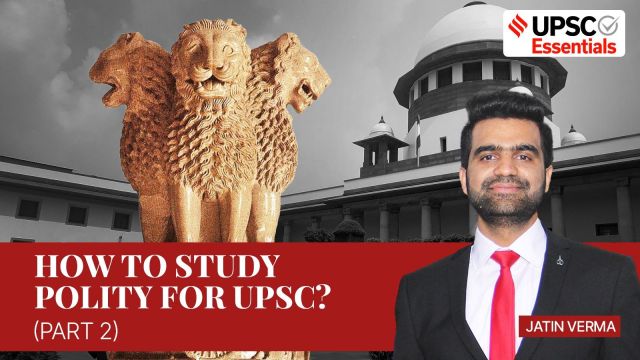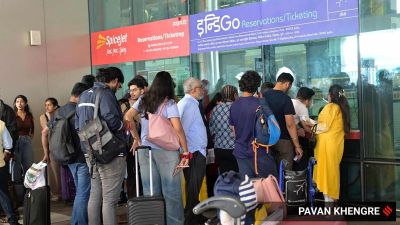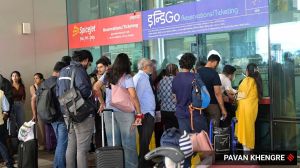Manas: Often said about the UPSC syllabus that it has interlinks and overlaps with various other subjects. Is it also seen with Polity? How can the understanding of Polity help students in other areas of the UPSC syllabus too?
Jatin Verma: Considering the generalist nature of civil services in India, having inter-linkages across subjects has to be naturally there in any examination that selects civil servants. These inter-linkages and overlaps have become more discernible, especially when we look at the last 10 years of questions since the UPSC changed the syllabus and the pattern, in 2013, to reflect contemporary challenges that young civil servants are going to face, once in service.
Understanding these inter-linkages and overlaps helps ease the task of budding UPSC aspirants, more so in the age of information overload. This eliminates duplication of effort — in terms of reading/collecting similar content for overlapping topics.
When it comes to Indian Polity, certain areas of overlap are worth mentioning:
1. Government policies and interventions for development in various sectors and issues arising out of their design and implementation – a topic of G.S. Mains Paper-2 overlaps with Inclusive growth and issues arising from it — a topic of G.S. Mains paper-3
Story continues below this ad
2. Issues relating to the development and management of Social Sector/Services relating to Health, Education, and Human Resources (G.S. Mains paper-2) overlap with Inclusive growth and issues arising from it. (G.S. Mains paper-3)
3. Post-Independence Consolidation and Reorganisation; Women Empowerment (G.S. Mains paper-1 topic) overlaps with certain topics of Indian polity like the State Reorganisation Commission etc.
4. Welfare schemes for vulnerable sections of the population by the Centre and States and the performance of these schemes overlaps a lot with G.S. Mains paper-3
5. The role of women and women’s organisations (G.S. Mains Paper-1) overlaps with the role of NGOs, SHGs, various groups and associations, donors, charities, institutional and other stakeholders.
Story continues below this ad
When it comes to overlapping with optional subjects, Indian Polity overlaps a lot with Public Administration and Political science.
More than the explicit overlapping, an aspirant needs to learn the art of ‘slicing and dicing’ wherein the knowledge and information relating to a topic needs to be used for another topic in another GS paper — be it essay, ethics, or optional subject paper.
However, the harsh reality is that one gets to see these interlinkages only after going through all the topics multiple times, which is what I call ‘after going through the grind’.
Manas: What are some of the major areas in Polity that require more attention and take more time to understand and memorise?
Jatin Verma: In the initial phase, try to understand constitutional philosophy well. One must cover Preamble, Fundamental rights and DPSPs well and try to supplement theoretical learning with newspaper reading to understand their varied interpretations and concretise them.
As your understanding develops, you will be able to solve the concept-oriented, application based questions as well. Topics such as Fundamental Rights, Parliament and Centre-State relations would initially take some time, but after first few readings, you will feel more familiarsied with them. It becomes important to not leave them mid-way and revise within the same week to reinforce them in your memory.
Story continues below this ad
Manas: There are some re-occurring doubts which the aspirants who are also our subscribers ask often — notes making, revision strategy, newspaper reading and more…
Jatin Verma: They are common but essential doubts. Let’s briefly discuss each one of them.
Notes Making: It is better to make notes in an integrated manner for both prelims and mains due to the dynamic nature of questions being asked in prelims as well. Many candidates just prepare for prelims a few months before prelims. This should be avoided as the time window between prelims and mains is reducing. Remember, the questions in prelims and mains are being framed from the same information base, more so in the last couple of years. So make notes simultaneously.
Revision and retention: Read and revise from one source only. Make your own notes for the topics, which you think are difficult for you. Don’t switch from one book/ source to another just because you think that the content is difficult for you to absorb in the first or second instance. After two or three readings from the same source, you will find that you can comprehend it.
Story continues below this ad
Striking a balance between static and dynamic (current affairs) portion: To begin, an aspirant must be thorough with basic facts about the Constitution — preamble, Federalism, Fundamental Rights, Directive Principles, etc. For Prelims, the static portion remains important as without it, one won’t be able to answer the questions despite having good command over the dynamic section as prelims are about minute details and pin-pointedness when it comes to choosing the correct option.
To illustrate, there is no point in developing opinion around the Uniform Civil Code unless an aspirant has got command of various connotations of secularism- positive and negative (Article 25). The same goes for the basics of the Election Commission of India (Article 324) and simultaneous elections.
The best way to go about striking the balance is to draw the cue from the previous years’ questions.
There is no point in spending too much time on newspaper reading until and unless an aspirant is thorough with the basics of every important institution- from President to bureaucracy. After attaining that level of understanding of Fundamental rights, DPSPs, Federalism, an aspirant would be able to appreciate the dynamic side of such topics, i.e. the gap between the letter and spirit of the constitution.
Manas: Speaking about current affairs, how important are the newspapers and how should one approach newspapers for Polity?
Jatin Verma: The importance of newspaper reading, in general, for all the stages/papers of UPSC CSE has been increasing ever since the change of syllabus in 2013. Be it G.S. Mains paper-1 (Social issues) or G.S. Mains paper-3 (Economy, Cyber Security, Disaster Management), the role of newspaper reading in CSE is no longer just limited to amassing factual information for prelims. Rather, it helps an aspirant in framing original, unique opinions on every issue of national and international importance. As UPSC is asking questions that are beyond the pale of regular coaching material and periodicals (for example, impact of work from home on family relationships), regular reading of newspapers, especially editorials and explainers becomes important to comprehend the nuances of various topics of current affairs even as the UPSC goes beyond conventional books.
Story continues below this ad
As far as the importance of newspaper reading for Indian Polity is concerned, it is important to understand what to read and how much to read. Aspirants must first clearly draw the contours through the official UPSC G.S. Prelims and Mains question Paper-2. Make a list of topics after doing a trend analysis of the last 8-10 years’ question papers. After this, while reading the newspaper, be watchful for news articles related to constitutional amendments/salient judgment/legislative proposals/regulatory bodies, and other keywords mentioned in the G.S. Mains paper syllabus and as deduced from previous years’ questions — both prelims and mains — and make your notes for such topics. Having good command over the static section will ease one’s task of reading polity-related content in the newspaper and after a certain period, both static and dynamic sections start feeding into each other.
Remember, it is equally important to know what is not to be read in the newspaper.
Manas: Often beginners are not able to understand the difference between Politics and Polity as a subject. How should they figure out what is relevant and irrelevant when studying Polity?
Jatin Verma: I cannot agree more. Many times, as a teacher, I see aspirants burdening themselves more with politically motivating content at the cost of the content that is relevant for cracking this exam. As I mentioned earlier, it is more important to know what is not to be read as there is limited time available at the disposal of every candidate, considering the vast syllabus and competition.
To understand what is to be read, it is important to not lose sight of previous years’ questions of Indian polity and governance and have a look at toppers’ answer copies. Doing this exercise at periodic intervals, they will get to see clearly that none of the UPSC questions are politically motivated/inclined. Even while answering in mains, a candidate is expected to be objective (neither too pro nor too critical of any political dispensation) in their views. Here, choosing a politically neutral journal/source of information is equally important.
Apart from this, an aspirant must keep in mind at all times that they are preparing for the Civil services examination and they need to be politically neutral, keeping aside their own political opinions, whatsoever.
Manas: How to make Polity both interesting and productive for UPSC and life in general?
Jatin Verma: Polity is a subject that one must read in their capacity as a citizen of this proud country. It makes us a responsible citizen if we study it in the right earnest. Topics such as RTI, Citizens Charter, Lokpal, Right to Public Services Delivery Act, and Citizen- Administration interface, especially with the police authorities, make us empowered citizens at the least.
Story continues below this ad
While reading it for exam preparation, correlate every piece of factual information with practical aspects of civic life — our rights, duties, secular outlook, and unity in diversity. Cultivate the habit of satiating your curiosity of ‘what, when, why, where, and how’ related to any polity topic. Also, make a list of questions for which the answers are not available in mainstream books/newspapers and search for them online. You will notice that this exercise helps you cover the subject interestingly and will also help you answer tricky questions, such as the one on Aadhaar.
It helps us understand our duties as a “sovereign” and in framing an informed opinion on every issue of national importance. One is getting this privilege only because of one’s UPSC preparation. The understanding you gain around these issues, in the course of your UPSC preparation, would serve you for your entire life.
Manas: Your final Dos and Don’ts for the aspirants and the misconceptions about Polity that aspirants should do away with.
Jatin Verma: Here are some Dos and Don’ts that aspirants may find useful in their Polity coverage for UPSC preparation —
Dos:
1. Revise from the same source again and again
2. Make notes only after you have understood the topic
3. Attempt PYQs after you have studied the topic
4. Try answering Mains practice questions before you appear in Prelims
Story continues below this ad
5. Make notes in an integrated manner, for both prelims and mains.
Don’ts:
1. Avoid reading multiple books and confine yourself to one or two books
2. Over-use of the internet needs to be avoided
3. Avoid propagating your political ideologies under the garb of UPSC preparation(at least till your selection!)
4. Confining yourself to anyone or two Coaching institutes’ notes at the cost of your own notes.
5. Don’t skip the Newspaper reading as UPSC appreciates originality of opinions and unique points of view, be it in prelims or mains.
It is important here to bust the misconception that preparing polity is limited to just reading Indian Polity by M. Laxmiknath and a popular UPSC oriented magazine. Widen your horizons of understanding of a topic by regularly following one good newspaper. One need not follow two or three newspapers, as eventually, one newspaper will cover all shades of opinion and topics.
UPSC Essentials | Expert’s talk: How to study Indian Polity For Civil Services Exam ? (PART 1)
🚨 The Indian Express UPSC Essentials brings to you the February edition of its monthly magazine. Click Here to read. Share your views and suggestions in the comment box or at manas.srivastava@indianexpress.com🚨
Share your views and suggestions in the comment box or at manas.srivastava@indianexpress.com
Subscribe to our UPSC newsletter and stay updated with the news cues from the past week.
https://www.youtube.com/watch?v=lPCAa68N_7I?si=7B67X7OY5HSw_Bhw&w=560&h=315


































